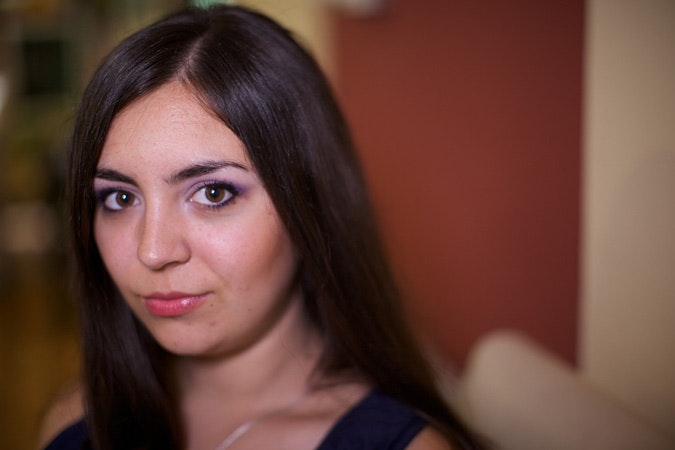Love and Identity
By Marina Vasic

“To marry or not to marry?” This is one of those monumental questions in life that, for me, has been made even more complicated by my identity. I am the child of a mixed marriage: my father is Roma, my mother is not. Growing up in Serbia, being only half Roma did not spare me from rejection, and for a long time I tried to hide my identity. Only recently have I begun to accept this part of me. But now I am faced with a new dilemma. What will happen to my identity when I decide to marry?
I vividly remember the moment I realized that some people would never accept one part of my family. It was the first time the kids in my neighborhood laid eyes on my cousin. He had come to our house, violin in hand, to play music with my father. I was young and I thought I could protect my cousin from their taunts (and perhaps also protect myself) by simply explaining that he wasn’t really different from us, his skin was just a bit darker from the sun. I’m a slightly embarrassed to admit this now as it wasn’t the cleverest of retorts, but I was young and still unaware of how to react to people’s taunts.
It wasn’t until I moved to Budapest that I began really spending time with other Roma. At first I felt strange, and even experienced a different kind of rejection. I encountered some Roma who believed that to be half-Roma was the same as not being Roma at all. But even though I didn’t have the words to defend against this idea, I knew deep down that it couldn’t be true. If I wasn’t really Roma, then what could I explain the feelings of hatred I experienced in Serbia?
Over time, I started to realize that it wasn’t other’s perceptions that mattered. What mattered was how I perceived myself. All the sudden it felt like a veil of ignorance had lifted. Everything seemed perfectly clear. It was no longer necessary to hide. And it didn’t matter what people thought. I knew I was Roma.
I worked to strengthen my acceptance of my identity and last summer decided to attend Barvalipe, a summer camp created to help instill pride in young Roma about their identity. Many camp participants were half-Roma like me, but it was there that the issue of marriage began to weigh heavily on my mind. I still can’t remember who made the comment but someone noted that when a half-Roma woman marries a gadzo (non-Roma guy), she will lose her Roma identity, and her children will be “cleansed” of any Roma roots. This was so upsetting to hear. I have been in a relationship with a gadzo for almost four years and he has supported me in my quest to understand my identity. What were my alternatives?
“To marry, or not to marry?” As I consider this question now, I am deeply torn. Should I abandon all the happiness that has embraced me? Even if I choose to marry a gadzo, I am not fully sure that I will be accepted within Serbian society. If I dedicate myself to finding a Roma husband, I am afraid that I will not be capable of adjusting to the costumes and traditions that have never been a part of my every-day life. My uncertainty is further increased by the fact that I don’t speak the Romani language. And what if my future Roma husband and I are divided with more serious boundaries, like religion? Is all of this simply justified by the fact that my husband is Roma? Is this what counts?
I am between two extremes that cannot be easily reconciled. Maybe I will ask my cousin what to do. He could very well say: “You are not really Roma. Your skin is just a bit darker from the sun,” pushing me into the gadzo`s hands. But I have never felt more Roma then I do now. I have accepted the Roma flag: the wheel and the blue and green colors are now part of me. Having embraced this identity I can no longer deny who I am. Once I accepted symbols that are strengthening my identity, I would choose any path needed to build myself completely. I am aware that my decision can become a burden in one moment, but I am willing to take that risk.
Marina Vasic was a participant at Barvalipe, the first-ever Roma pride camp.


